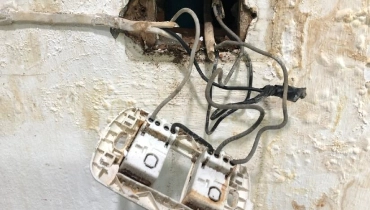
Mr. Electric explains how water can damage electrical wiring and what steps to take if it happens.
|
Flood damage is often obvious in the form of stains, damaged furniture, mold, and a musty smell. What’s less obvious is what happens to your electrical wiring after flooding. If your home has flooded, your electrical wiring will most likely need to be replaced, even if it was only temporarily, to ensure your home’s electrical systems are safe.
Although electrical wiring is insulated, water can still damage your wires to a point where usage will become dangerous due to spark risks.
Mr. Electric is here for you with our emergency electrical services to ensure that you get the help you need when you need it most.
Related Topic: Are There Fire Dangers Hidden in Your Walls?
Does Water Damage Ruin Electrical Wires in a House?
Water damage can ruin your wires, but it’s not always just the water. It’s important to remember that a flood isn’t always clean water pouring into your home. Floods, especially those from natural disasters and storm surges, often can come with various contaminants such as gas, oil, farm runoff chemicals, and even sewage. Although the water itself is damaging, the real concern might just be brought in by the water and not the water itself.
Electrical Test After Water Damage
After a flood, before using any of the electrical appliances in your home, have a licensed electrician come to your home to perform an electrical test. Electricians, like those at Mr. Electric can provide a variety of tests to figure out exactly where your wiring stands after a flood. However, even if your wiring passes the various tests in terms of safety, it’s recommended that you at least consider replacing your wiring in the affected area. This is because even if your wires perform at a safe level immediately after flooding has occurred, corrosion could continue over time, reducing the safety levels of your wires down the road. After inspection, your electrician can help explain what you’ll need to do next, if anything, to keep your home safe.
Do You Need to Replace Electrical Wiring After a Flood?
Even if your wires were only flooded briefly, you’ll most likely need to replace them. If your home has had standing water in it for an extended period, the chance of deterioration of your wire’s insulation will be increased.
How to Move Your Outlets Higher on a Wall
If you’re in an area with regular flooding, one way some homeowners try to combat flood damage is to raise outlets above average flood levels. This is a good idea for your basement or other areas that might experience flooding more often. The process involves cutting new holes in your drywall for the receptacle boxes and patching up the old ones. Then, wires are run to the new location, outlets are properly connected and tested by plugging in a device or using a multimeter. Licensed electricians should only handle a project like this.
It’s also important to know that raising your outlets won’t entirely solve the problem. Flooding can occur for many different reasons, and your wires and outlets can still be damaged, even if they are raised. If the source of the water is an overhead leak like a pipe burst, raised outlets can still be damaged. Wiring also will need to be raised to match the raised outlets, as wiring that stays in a common flood zone will still be at risk.
Related Topic: 5 Things You Can Do to Better Prepare for Severe Weather
Trust Mr. Electric for All Your Post-Flood Electric Work
After a flood, it’s important to address any electrical concerns immediately. Your local Mr. Electric offers emergency electrical services to restore power as soon as the water is cleared from your home. We can also perform an electrical inspection to test and replace any damaged wiring to restore your home to its pre-flood levels. Schedule an appointment or call to get started.
